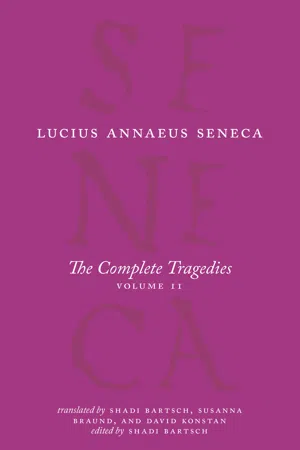![]()
Hercules on Oeta
Hercules has just conquered the town of Oechalia to get to the king’s daughter, Iole, and has killed her father and brother. The princess has been sent to his home in Trachis, where his current wife Deianira lives. As the play opens, Hercules boasts of having brought land and sea under his dominion everywhere: he is ready for deification. A stark contrast is provided by the chorus of grieving Oechalian women, including Iole, who lament Hercules’ brutality.
In Trachis, Deianira in turn voices her rage against Hercules for this latest infidelity. The nurse tries to calm her, but Deianira is even ready to kill her husband. To divert her into another plan of action, the nurse suggests magic instead, and Deianira remembers the love potion given to her by the centaur Nessus. Although he had tried to rape her, and was killed in the process by Hercules, he gave her some gore from his wounds as he lay dying and claimed it would win back her husband from any future rivals for his love. A robe is smeared with this philter and sent to Hercules via the messenger Lichas.
A choral ode expressing sympathy for Deianira’s plight is halted by the queen’s sudden appearance: belatedly, she fears the philter may be poisonous. At this moment her son Hyllus arrives from Oechalia and announces that when Hercules donned the robe, it began to eat his flesh. Hercules killed Lichas in rage and is now being carried home. Deianira makes preparations for her suicide.
Hercules is brought in, in agony, and condemns Deianira despite her suicide. He wants to attack his disease as he has attacked his other enemies, but it is within him. He realizes his death is in accordance with a prophecy heard long ago and prepares to die in a way that befits his glory. At his instructions, a pyre is built on Mt. Oeta. The chorus is not sure if he is ascending to the heavens or going to the underworld, but Philoctetes returns from Oeta and describes the bravery with which Hercules immolated himself. His mother Alcmene is overcome by grief but hears Hercules consoling her from the heavens.
![]()
Introduction
David Konstan
Scholarly opinion is divided on whether to assign this play to Seneca himself or to some unknown imitator of his tragic style.1 It is included and comes last in both the major manuscript traditions, in ninth place or, in the tradition that includes the certainly spurious Octavia, in tenth (in this latter it is given the title Hercules Oetaeus, just as the first play in the series is called Hercules Furens; the former tradition labels both simply Hercules). The main arguments against authenticity have to do with its length (it is the longest play to survive from classical antiquity), repetitiveness, and rhetoric (which sometimes seems exaggerated even by Senecan standards); in addition, some passages appear to draw on plays recognized as genuine (especially Hercules Mad), and there are also some subtle features of style, diction, and meter in which Hercules on Oeta differs from Seneca’s other tragedies. Nevertheless, the question remains open. My own view is that the play might well be by Seneca but be incompletely revised and so lack the compactness and some of the refinement of his other tragedies.
The closest model for Seneca’s play is Sophocles’ Women of Trachis, in which Hercules brings back Iole as a slave after sacking her city and installs her in his home to the distress of his wife, Deianira. To recover his love, Deianira prepares a potion given to her by Nessus, the centaur who volunteered to carry her across a swollen river and who, when he attempted to rape her, was slain by Hercules with an arrow dipped in the Hydra’s poison. The potion, made from Nessus’ blood, in fact carries the same poison, and when Hercules dons the cloak that Deianira doused in it, his flesh is consumed and he realizes in his final agony that this death was fated (he also orders his son Hyllus to marry Iole). In the meantime, Deianira, having realized her error, kills herself. The dramatic tension is produced by the...
